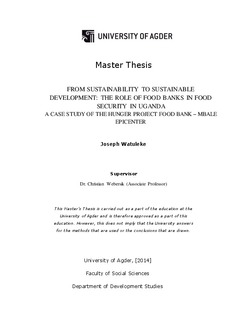| dc.contributor.author | Watuleke, Joseph | |
| dc.date.accessioned | 2014-10-01T07:55:42Z | |
| dc.date.available | 2014-10-01T07:55:42Z | |
| dc.date.issued | 2014 | |
| dc.identifier.uri | http://hdl.handle.net/11250/222432 | |
| dc.description | Master thesis in development management - University of Agder 2014 | nb_NO |
| dc.description.abstract | The purpose of this study is to identify the role the food bank plays for food security, sustainable livelihoods and building resilience to climate change among smallholder farmers in Uganda. The aim is to investigate how the food bank in Uganda operates in relation to food security and smallholder farmers. Much of the studies on food banks reveal that food banks are merely institutions that offer emergency food supplies to the hungry and are not agencies aiming at food security. These studies have, however, been based on the context of developed countries and no study has been conducted to establish the role of food banks in the context of developing countries. This study was based in the eastern region of Uganda, and used a sample of eighty respondents to examine the role of food banks. The study was conducted qualitatively, guided by the sustainable livelihood framework adapted from the Institute of Development Studies (IDS). The results reveal that, much as it is currently hard to measure the socioeconomic impact of the food bank on smallholder farmers in the area of study because of the difficulty in isolating its contribution from that of interrelated programs and activities farmers are involved in; it is evident that the food bank was playing a significant role in improving the smallholder farmers’ food production and incomes. The food bank is actively engaged in training smallholder farmers in modern farming methods, provision of improved seeds and safe storage facilities for farmers produce, as well as helping farmers do diversify their livelihood sources, and providing climate-related information. Prolonged droughts and lack of access to quality and sufficient seeds are among the main sources of food insecurity among smallholder farmers. Distance to the food bank and lack of access to information are some of the factors that affect many farmers abilities to participate in the food bank activities. Community ownership of the food bank is still lacking and provides a long term threat to the sustainability of the project if not well handled. The study recommends: establishment of community-managed food banks at lower levels to ensure community ownership; ensuring equitable distribution of benefits among all target farmers; encouraging seed saving by farmers; initiation of a community supported agriculture program to reduce the problem of lack of farm credit; and investing in rainwater harvesting facilities. | nb_NO |
| dc.language.iso | eng | nb_NO |
| dc.publisher | Universitet i Agder / University of Agder | nb_NO |
| dc.subject | UT-503 | nb_NO |
| dc.subject | food security | nb_NO |
| dc.subject | food bank | nb_NO |
| dc.subject | sustainable livelihoods | nb_NO |
| dc.subject | climate change | nb_NO |
| dc.subject | smallholder farmers | nb_NO |
| dc.title | From sustainability to sustainable development: the role of food banks in food security in Uganda : a case study of the hunger project food bank - Mbale epicenter | nb_NO |
| dc.type | Master thesis | nb_NO |
| dc.subject.nsi | VDP::Social science: 200::Economics: 210 | nb_NO |
| dc.subject.nsi | VDP::Agriculture and fishery disciplines: 900::Agriculture disciplines: 910 | nb_NO |
| dc.source.pagenumber | 161 p. | nb_NO |
